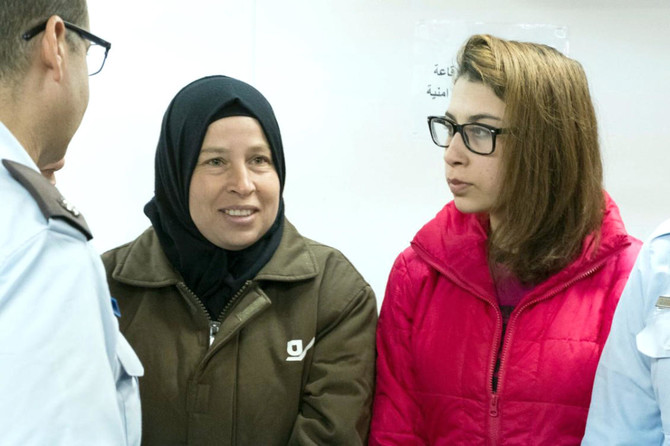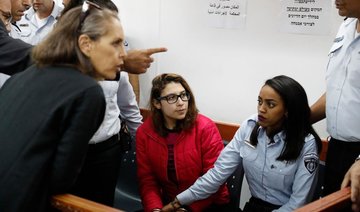RAMALLAH: Ahed Tamimi has been in jail since Dec. 15. The 16-year-old Palestinian girl, who became internationally famous when a video of her and her cousin Nour Tamimi slapping two Israeli soldiers went viral last month, remains in Israeli custody — along with her mother Nairiman — while Nour, 20, was released early Friday after posting bail of $1,450.
“Ahed is suffering in dire conditions in Israel’s Hasharon prison,” her aunt Manal Tamimi told Arab News. Manal was released from Hasharon herself on Wednesday, having been arrested, she said, “during a peaceful rally” in Western Ramallah. She was accused of the attempted assault of a female Israeli soldier.
“Ahed’s suffering isn’t only due to poor conditions including cold and inadequate food, but also to attempts to break her spirit,” Manal continued. She cited procedures including a five-hour transfer from Hasharon to Ramla prison, after which Ahed was moved to Ofer detention center and placed in “a very cold cell” for the day. Manal said Ahed had also been placed in solitary confinement on occasion.
Manal said that while she was in custody, she was able to communicate with Ahed, Nour and Nairiman, who were in cells opposite her.
“Her mother and I tried to offer support,” Manal told Arab News. “We were worried about Ahed, because she would be on the verge of collapse when she returned after many hours travelling from one prison to another.”
However, she added, Ahed’s spirits remain high because she believes Palestinians must resist occupation, regardless of the consequences.
When Ahed learned that Nour was to be released, Manal said, Ahed gave her cousin the password to her Instagram and Facebook accounts “so she could find out how the world was reacting to her case.”
Ahed will remain in custody at least until her hearing on Monday, when the prosecution is expected to add to the 12 charges already filed against her. Ahed’s Israeli lawyer Gaby Lasky was not immediately available for comment.
Nour’s father Naji, who was released from jail Friday morning, says Israeli forces raided his house and detained his daughter at 3:30 a.m. and that most of the questions she faced were about the video in which Nour and Ahed confronted the two soldiers.
He claimed the Israeli media was inciting hatred against his family, and Ahed in particular. “They always describe the family as having ‘a long history of terrorism,’ as if they are talking about ISIS,” he said.
The Tamimi family make up a large portion of the 600-strong population of their village, Nabi Salih, in Ramallah. The village is known for its activism, including a weekly rally after Friday prayers.
“Popular resistance isn’t new (here),” Naji said. “The village has been suffering from restrictions imposed by Israel.” Illegal settlements, he said, have “swallowed” vast areas of land around the village, and there were, until recently, two Israeli military checkpoints nearby.
However, in a move which offers hope to the Tamimis, Israel recently removed one of the checkpoints, he said, “following popular and media pressure.”
A family affair: The Tamimis’ history of resistance
A family affair: The Tamimis’ history of resistance

Senior Hamas figure among 7 killed in Israeli airstrike

- Pair of Israeli airstrikes hit Gaza's Deir Al-Balah, killing a Hamas commander
- Boy, aged 16, among the dead
CAIRO: A senior figure in the armed wing of Hamas was among seven people killed on Thursday in a pair of Israeli airstrikes in Deir Al-Balah in the central Gaza Strip, a Hamas source said.
The Israeli military did not immediately respond to requests for comment on the incident. The Hamas source said one of the dead was Mohammed Al-Holy, a local commander in the group’s armed wing in Deir Al-Balah.
Hamas condemned the strikes on the Al-Holy family, in a statement that did not mention Mohammed or his role in the group. It accused Israel of violating the ceasefire deal in place since October, and attempting to reignite the conflict.
Health officials said the six other dead in the incident included a 16-year-old.
Israel and Hamas have traded blame for violations of the ceasefire and remain far apart from each other on key issues, despite the United States announcing the start of the agreement’s second phase on Wednesday.
More than 400 Palestinians and three Israeli soldiers have been reported killed since the ceasefire took effect in October.
Israel has razed buildings and ordered residents out of more than half of Gaza where its troops remain. Nearly all of the territory’s more than 2 million people now live in makeshift homes or damaged buildings in a sliver of territory where Israeli troops have withdrawn and Hamas has reasserted control.
The United Nations children’s agency said on Tuesday that over 100 children have been killed in Gaza since the ceasefire, including victims of drone and quadcopter attacks.
Israel launched its operations in Gaza in the wake of an attack by Hamas-led fighters in October 2023 which killed 1,200 people, according to Israeli tallies. Israel’s assault has killed 71,000 people, according to health authorities in the strip, and left much of Gaza in ruins.














